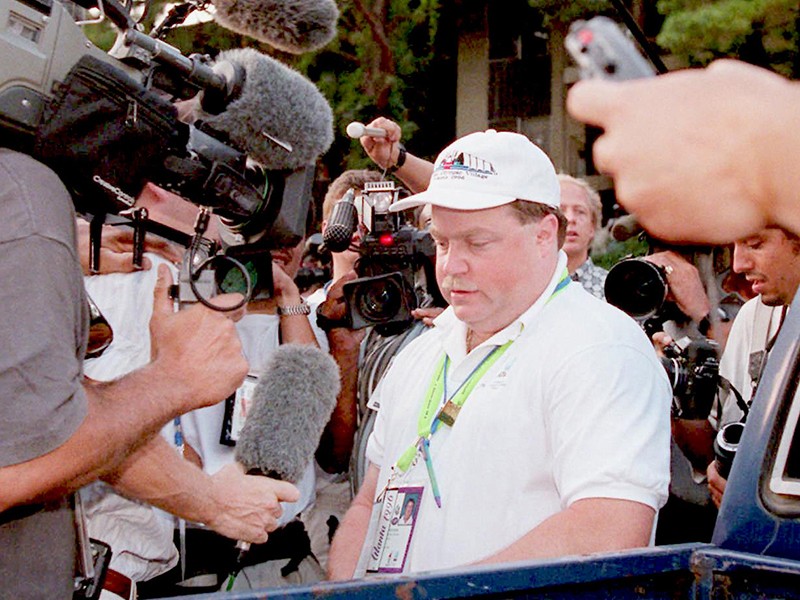Richard Jewell, the former Habersham County deputy sheriff who was wrongly accused in the bombing at Centennial Olympic Park in Atlanta during the 1996 Summer Olympics, is the subject of a new Clint Eastwood-produced movie.
Initially called “The Ballad of Richard Jewell”, the movie is being filmed in and around the Atlanta area. The 23rdanniversary of the bombing of the park is Saturday.
Filming began on the production recently, with Eastwood defying the widely publicized verbal boycott of Georgia by many Hollywood actors and production companies. Eastwood told entertainment reporters that filming in Atlanta is necessary for the film to maintain authenticity.
While Jewell’s law enforcement career prior to the Olympics was in Habersham County — as a jailer, deputy sheriff and campus police officer — it doesn’t appear filming will take place there.
“No one has contacted us yet for any locations on that one,” said Habersham County Film Liaison Joey Duncan.
Leigh Stallings-Wood started her career as a dispatcher at Habersham Central Communications before it became 9-1-1 and got to know Jewell through her ex-husband, who worked with him.
Jewell used to eat breakfast at their house frequently.
Stallings-Wood said she was glad to read about Eastwood’s planned “Ballad of Richard Jewell” movie.
“Maybe somebody will hear the truth,” Stallings-Wood said. “It will be interesting to see how he’s portrayed.”
Jewell’s story is one that captured the attention of the world as the teddy bear-like security guard was first praised then almost immediately vilified worldwide, mainly because of “unnamed sources” cited by media organizations.
For Richard Jewell, law enforcement was more than a career it was a calling, though those who knew him said he was far from perfect.
It was due to one of the pitfalls in his career that Jewell worked as a security guard at Centennial Olympic Park in Atlanta when a bomb exploded on July 27, 1996.
The next 72 hours were a whirlwind for the former Habersham County deputy sheriff as he went from hero to suspect in the deadly incident.
TV, radio and print products circulated the red-faced security guard’s picture with headlines condemning him.
Kenny Thompson, who serves as director of special investigations for the Georgia Department of Insurance, was a police officer in Cornelia when he met Jewell in the mid-1980s.
“He was an overzealous guy that just loved law enforcement,” Thompson said. “He wanted to be a cop more than anyone I’d ever seen.”
Those who knew Jewell during his time at Habersham County admitted he was not a model officer. Jewell drove an old ratty patrol car he sometimes neglected to maintain, and he struggled to keep his appearance polished and presentable.
“It kind of looked like it had two busted shocks on the left side, like maybe he had used it on a dirt track somewhere and he had used it for racing, because it was always leaning when it went in a turn,” Thompson said. “It was not the best car in the fleet – and he didn’t maintain it too well.”
The volume knob on the car’s AM/FM radio was broken at full volume, Thompson said.
“I’ve had him pull up to calls before with 96 Rock blaring in the background,” Thompson said.
Stallings-Wood said Jewell often struggled to maintain his personal appearance.
“I have to laugh because there was one time when he came to the house,” Stallings-Wood said. “He was dressed in his uniform, had his tie on and everything, and he was very adamant about not getting anything on that tie. He spilled gravy all over the tie that day, and I actually washed it for him and cleaned it up before he went back to work. Richard always wanted to look the part and be the part and be helpful. He just was a good ol’ boy.”
Jewell worked night shift for the Habersham County Sheriff’s Office, then stayed over to ride with day shift deputies, Thompson said.
“At that time, I was working for Cornelia Police Department, he was working for the sheriff’s office, and he would come ride with people at the police department in Cornelia, Baldwin, Demorest – wherever he could catch a ride,” Thompson said. “He was always ready to go. He was so gung-ho. He wanted to be at everything, every call. If there was a way for Richard to get there, he was going to try to get there.”
Still, despite his commitment to working almost all the time, Jewell’s early law enforcement career was not without hiccups.
According to Thompson, Jewell was the black sheep of the sheriff’s office, but it never discouraged his desire to pursue a career in law enforcement.
“He truly wanted to be the best cop out there” Thompson said. “He had some shortcomings. He was probably more dedicated than he had ability. Not knocking Richard at all, but there were just some things he wasn’t cut out to do.”
Jewell resigned from the Habersham County Sheriff’s Office after totaling a new-to-him patrol car. That resignation led him to seek employment related to the Olympics, Thompson said.
Jewell then worked briefly as a campus police officer on the Demorest campus of the college.
“He lived and breathed being in law enforcement,” Thompson said. “When he couldn’t get a job in law enforcement, that’s when he was working as a security guard at the Olympic Park bombing.”
Jewell secured a position as a security guard with AT&T at Centennial Olympic Park for the 1996 Olympics; a position that changed the rest of his life.
At 1:20 a.m. July 27, 1996, during a free concert, a green U.S. Military ALICE field pack that contained three pipe bombs surrounded by roofing nails exploded. The explosion killed 44-year-old Alice Hawthorne of Albany when one of the nails penetrated her skull; a 40-year-old Turkish cameraman suffered a fatal heart attack while running to the scene; and 111 bystanders were injured.
Though Jewell was hailed a hero after the bombing for his role in evacuating people in the area of the device, within four days that praise changed to accusations as he was considered a suspect.
Then-Piedmont College President W. Ray Cleere contacted the FBI and told them to look hard at Jewell as a suspect in the incident.
After being cleared of the bombing, Jewell sued Piedmont College in Demorest, with the suit accusing Cleere of describing Jewell as a “badge-wearing zealot” who would “write epic police reports for minor infractions”, court documents state.
Stallings-Wood, who was assigned to the command post at the rowing venue on Clarks Bridge Road in Hall County, was on the job when she heard Jewell was announced as a suspect in the bombing.
“My boss at the time turned around and looked at me and said, ‘Don’t you know him? He’s from Habersham.’ Sitting beside me was the FBI, so I actually spent the next two hours with the FBI being interviewed about him. I got home that night and GBI, FBI, news media was all over Clarkesville.”
Perhaps due to their proximity to Habersham County while covering the Olympics or perhaps due to their desire to be the first to have the story, media outlets worldwide sent crews to the Clarkesville area to begin digging into Jewell’s background and to seek out anyone who knew him or would comment.
“The news media and things were so bad around the house that the sheriff’s department put an extra patrol on the house because it was a circus,” Stallings-Wood said.
Stallings-Wood, who had an unlisted number at the time, said she had multiple voicemails that requested interviews from both her and her ex-husband; but neither of them felt Richard could be responsible for such a heinous crime.
“I couldn’t see Richard harming another person like that,” Stallings-Wood said. “I could see him running to help people, but not intentionally hurting somebody.”
For the people who knew Richard on a personal level, the accusations against him seem unimaginable and impossible.
“There’s no way that Richard Jewell would have done this,” Thompson said. He’s too good-hearted. He wants to help people.”
Not only did Thompson believe Jewell was too good-natured to commit the crime, but he felt Jewell was not capable of building such a complex device.
“I don’t believe he had any bomb-making skills at all,” Thompson said. “He wanted to be a cop, but he was not tactically proficient.”
Even though Thompson and Jewell only worked together and did not spent time outside their jobs, the FBI still knocked on Thompson’s door for an interview.
“I was interviewed by the FBI, as so was probably most people that ever associated with Richard Jewell,” Thompson said. “They came to my home. It was pretty short. They asked me what my opinion was of the case, and I told them I thought they had the wrong man.”
In the years that followed the Centennial Olympic Park bombing, Jewell resisted the “hero” label.
“I’ve been called a hero,” Jewell said in a 2005 interview with Newseum. “I really don’t see myself as that. I just did my job that night and did what I was trained and was supposed to do, and it wound up being a good thing. I wish we’d have had about five more minutes and maybe nobody would have been killed. That’s something I think about a lot.”
Jewell told Newseum that media outlets were so desperate to get the headline that they ran with unverified stories.
“This story started over here as me being a hero and finding a bomb and by the time it got all the way around, I was the suspect and was the bomber of the Centennial Park,” Jewell told Newseum.
Jewell maintained to Newseum that the scrutiny he was under affected not only him but also his mother.
“Just imagine when it’s one camera or two or three reporters on one story; an investigative reporter on a story,” Jewell told Newseum. “Imagine how much heat that causes a certain story or a certain organization and a certain family. I had thousands, thousands, of cameras – tens of thousands of reporters – on me and what I did, microscoping and checking everything from my elementary school career up to the day of the bombing.”
Jewell told Newseum the careless reporting that occurred during the 88 days until he was cleared as a suspect in the bombing impacted his life.
“It doesn’t matter if it’s a little story or a big story, if you get it wrong it’s going to hurt somebody,” Jewell said in the Newseum interview.
Thompson said Jewell initially was strong after the false allegations of his involvement in the bombing but added the stress of the situation took a toll on Jewell long-term.
“Personally, I don’t know that I would have held up as well as Richard held up, but I think in the end it killed him,” Thompson said. “I think his nerves – he was nervous all the time after that. I guess when you put not just a national spotlight on you but a worldwide spotlight on somebody saying that you killed these people and injured so many, it took a toll on him. It was tough. I know he had heart issues after that. His blood sugar, I think he developed diabetes after that.”
Even while under a worldwide media microscope, Jewell went to great lengths to get back into law enforcement.
“In his mind, it was his life mission,” Thompson said. “He wanted to be a cop worse than anything – even after all he was put through after that fiasco in Atlanta. Half the profession was bashing him and all he wanted to do was go back to work. He worked until he found another job.”
After being cleared of the crime in October 1996, Jewell filed defamation lawsuits against NBC News, The Atlanta Journal-Constitution and other media entities.
Thompson said even after receiving financial settlements in some of the cases, Jewell’s lifestyle didn’t change a lot.
“I know that he didn’t go into some lavish lifestyle and buy Lamborghinis. I think the most extravagant thing that I knew him to buy was a patrol car so he could get a job,” Thompson said.
Jewell later worked for Jefferson and Pendergrass police departments. It was in one of those cities where, when employed by the state, Thompson encountered Jewell.
“I had a car stopped in Pendergrass and Richard pulled up behind me in a patrol car and I was pretty surprised to see him back in a patrol car,” Thompson said.
Jewell and Thompson talked after their encounter. The two men hadn’t seen each other in several years. Jewell was happy to be back on the road on patrol, Thompson said.
“He was tickled to death,” Thompson said. “I’d heard that some of these departments hired him because he went and bought his own patrol car and honestly, I don’t think he cared. He just wanted to be a cop. If that’s what it took for him to be a cop, then that’s what he wanted to do,” he said.
Everyone in public safety knew Jewell wanted to get back into law enforcement, Stallings-Wood said.
“He wanted to be everybody’s friend,” she said. “He just felt like he needed to serve the public and to help. That’s all he ever wanted to do.”
In the end, Thompson said he hopes Jewell will be portrayed as the hero he was in the moments leading up to the bombing during the Summer Olympics.
According to Thompson, he believes Jewell saved lives the day of the Olympic bombing. He hopes Jewell will be portrayed as the hero rather than the villain in Clint Eastwood’s upcoming film.
“There were hundreds of cops there, and any one of them could have noticed that backpack – any one of them,” Thompson said. “In my opinion, the Lord said, ‘This is your calling today, Richard’. And he’s the one that saw it. I think he did a good thing.”
Thompson said Jewell’s instinct to check something as routine as a discarded bag in a venue like Centennial Olympic Park made a positive difference in the casualty count.
“Anything that I’ve said or anybody else has said about him, I think it culminated in that moment right there,” Thompson said. “He could have easily walked by it – and probably would have 99 out of 100 other days. He would have said ‘somebody dropped their backpack and went on about their business,’ but he didn’t. Something led him to try to clear people out and save them.”
One thing most people don’t know about Jewell is despite leaving the Habersham County Sheriff’s Office under less than favorable conditions, he didn’t forget those who worked there, Thompson said.
When Habersham County Deputy Sheriff Scott Smith died in an on-duty patrol car accident north of Clarkesville, he was remembered and honored on the national law enforcement memorial wall in Washington D.C.
“Richard Jewell bought plane tickets for every deputy in Habersham County, paid for their room and board, and sent them to D.C. for the ceremony,” Thompson said. “Nobody asked him to do that. He did that on his own.”
Richard was a good guy who received a raw deal, Thompson said.
“I don’t know that Richard was the best cop in the world,” Thompson said. “I don’t know that he was the smartest guy in the world. But I do know this, I think he was probably one of the most dedicated guys in the world. He was a goofball, but he was our goofball.”
Upon learning of Jewell’s death at age 44 via the nightly news, Stallings-Wood said, “It was sad because he’s part of history now. Richard almost to me became a recluse after all this. It was hard to get in touch with him. He didn’t go out and socialize like he used to.”
In addition to the Eastwood movie production currently filming in Atlanta, Richard Jewell’s story will be told during season 2 of Spectrum Originals’ anthology TV series Manhunt.
“Season 2, Manhunt: Lone Wolf, will chronicle one of the largest and most complex manhunts on U.S. soil – the search for the 1996 Atlanta Olympics Bomber – and the media firestorm that consumed the life of Richard Jewell in its wake,” according to Deadline.com. Cameron Britton will play Jewell in that production.
















